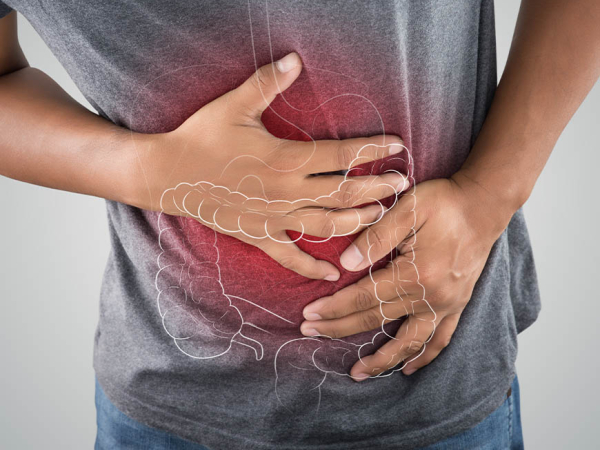The treatment of irritable bowel syndrome depends primarily on the subtype of the disease. Treatment is always comprehensive and includes changing dietary habits, psychological therapy, drug treatment and other forms of therapy. The response to treatment is highly individual and often not sufficient.
Diet
It is good to increase fibre intake. What is important is that it be soluble fibre that is less fermentable, such as ispaghula or psyllium. This is the only type of fibre that has a proven effect on IBS 1,2 . On the flip side it is important to be cautious with insoluble fibres, which can exacerbate the condition of some patients 2 . The role of food allergies has not been confirmed. For a large part of patients it is possible to find foods that worsen their condition through the method of trial and error, i.e. the food is eliminated from the diet and then reintroduced. These foods are generally not confirmed in testing for food allergies however. They are more individual intolerances. For the first six weeks it is recommended that a FODMAP diet be tried out. This is a diet that limits poorly digestible fermentable mono-, oligo- and disaccharides and polyols. It is a highly restrictive diet. Various types of fruits and vegetables, grains, dairy products, alcohol, sweeteners and sweets are eliminated. After the first 3-8 weeks, foods are gradually reintroduced, monitoring to see if the patient's condition worsens. A gluten-free diet is not recommended, as this has no effect on people with IBS 3,4 Psychological therapy and movement In particular patients that suffer from depression, anxiety or other concomitant psychiatric issues can be helped by various forms of psychological therapy. Appropriate kinds are cognitive behavioural therapy, relaxation therapy, psychodynamic interpersonal therapy and others. Sufficient movement can contribute to better quality of life and help reduce symptoms of irritable bowel syndrome 5 .
Pharmacological treatment
The effectiveness of pharmaceuticals in treating IBS is considerably limited and insufficient. The effectiveness of medicaments is harder to evaluate, as the response to placebo is higher in IBS than for most diseases, around 40%. Antidepressants interact with the brain-intestine axis, helping primarily with accompanying psychological problems such as anxiety, depression, somatisation and also handling pain for diarrhoeal forms of the disease. For these medicaments, unwanted side effects are frequent even at low dosages. Tricyclic antidepressants
(TCA) are more effective in patients with irritable bowel syndrome compared to other types. Antidepressants can also impact intestinal function. TCAs can improve diarrhoea by slowing down intestinal functions, while SSRIs (selective serotonin reuptake inhibitors) speed up passage through the intestines and are thus better suited for forms with constipation 6,7.
Rifaxamin is the only antibiotic suitable for treating the forms of IBS without constipation. It is an antibiotic that is only minimally absorbed into the circulatory system and acts primarily at a local level in the intestine, and for this reason it has a minimum of side effects. Its effect in treatment of IBS is relatively slight, however. The presumed mechanism of effect in IBS is modification of the intestinal microflora 8,9 .
Antispasmodics can be used in treatment of IBS. Various antispasmodics have been studied in terms of their effectiveness in treating irritable bowel syndrome, with the effect having been slight and side effects quite common, though not serious (dryness of the mouth, dizziness, blurred vision). Various medicines can be used for treatment depending on their availability, e.g. pinaverium bromide, hyoscine bromide,
drotaverine, etc.
Prosecretorics can also be used in treatment of irritable bowel syndrome (Linaclotide, Plecanatide, Lubiprostone). These are drugs that increase secretion of water, bicarbonate and chloride in the intestine. They primarily help as symptomatic treatment of constipation. Laxatives can also be used during constipation with IBS, e.g. glycolic products, magnesium salts. Eluxadoline can be used for symptomatic treatment of the diarrhoeal form. This is a combined agonist-antagonist of the opiate receptors in the intestinal tract. Eluxadoline relieves diarrhoea and it also seems to help with other symptoms as well. Occasionally it can however lead to pancreatitis, which is a serious side effect. For alleviating diarrhoea one can also use Loperamide, which has relatively frequent adverse side effects and many contraindications.
Non-pharmaceutical forms of treatment
In recent years, attention has also turned to various non-pharmaceutical forms of treatment for irritable bowel syndrome. Intestinal dysbiosis is frequently present with IBS, so various probiotics have begun to be studied. The effectiveness of probiotics in treatment depends on the particular bacteria strain. Studies done on probiotics are highly diverse, so it is hard to assess their effectiveness, but thus far it seems that they can help alleviate the overall symptoms in irritable bowel syndrome. The most studies so far have been done on the strains Lactobacillus, Bifidobacteria and Sacharomyces boulardii. Of natural preparations, peppermint oil has had good results. It relaxes the smooth
muscles, modulates the neural response and has an anti-inflammatory effect. As there are a whole range of peppermint oils, the majority of studies worked with specific products, primarily capsules which are released in the intestines containing 180–225 mg, two to three times a day 10 .
Various intestinal adsorbents can have a positive effect in treatment of IBS. The enterosorbent Enterosgel is a medical device that has also been approved for symptomatic treatment of chronic diarrhoea in IBS. Enterosgel removes toxins and various other harmful substances from the digestive tract. In the diarrhoeal form of irritable bowel syndrome, overproduction of bile acid frequently occurs. Enterosgel is
able to bind these bile acids. A major study is currently underway in England to more thoroughly assess the effectiveness of Enterosgel in treatment of IBS-D. The results will be published next year. Various personal experiences with Enterosgel in treatment of irritable bowel syndrome can be found on the web, for example at https://www.trustpilot.com/review/www.enteromed.co.uk .
